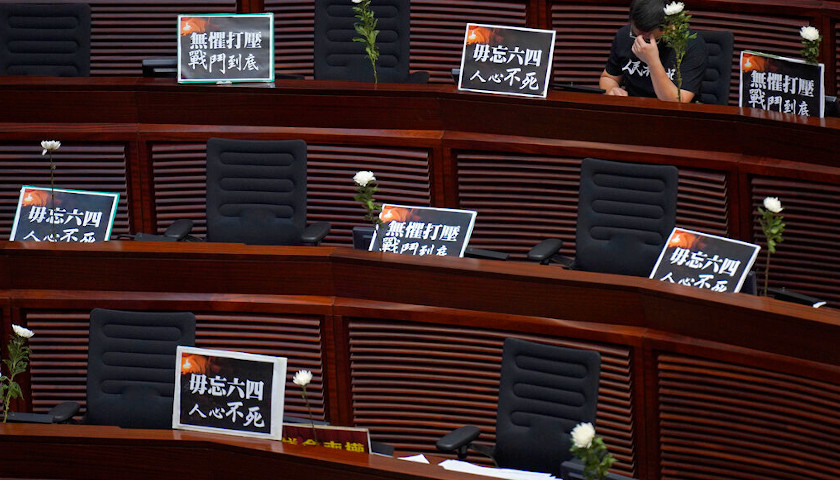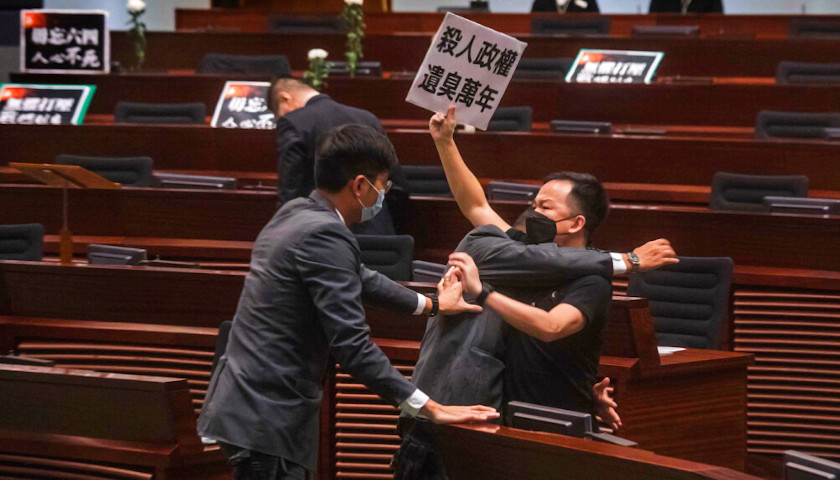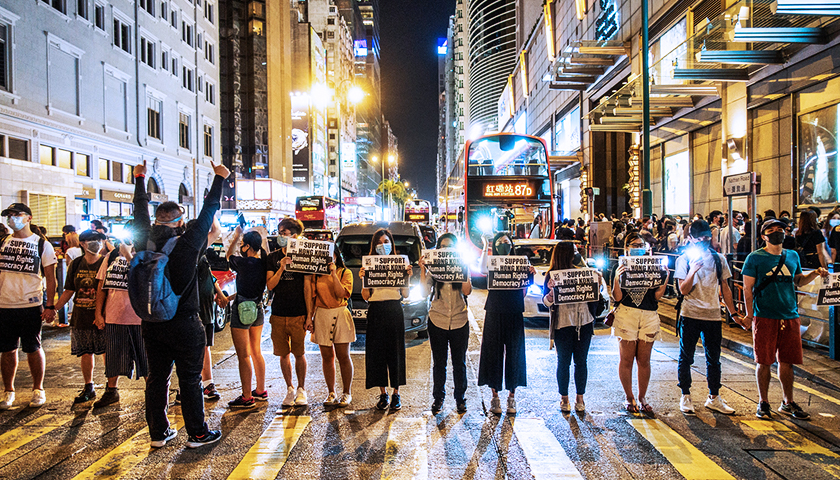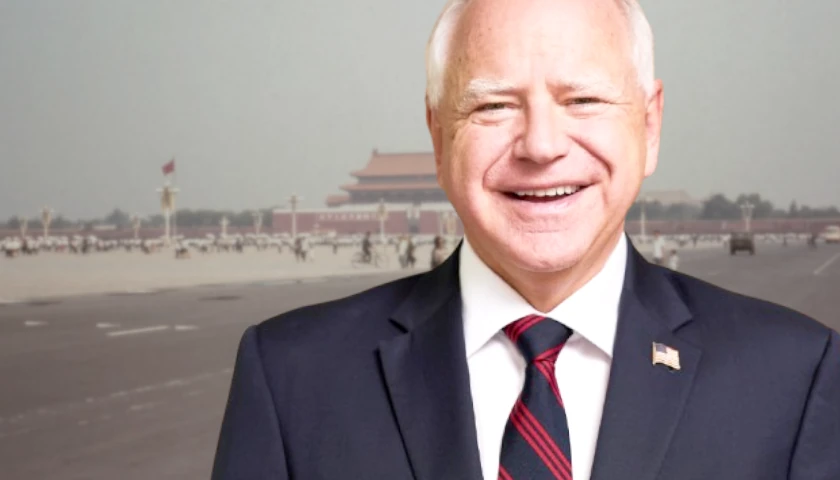HONG KONG (AP) — Hong Kong’s legislature approved a contentious bill Thursday that makes it illegal to insult the Chinese national anthem.
The legislation was approved after pro-democracy opposition lawmakers tried to disrupt the vote. It passed with 41 lawmakers voting for it and just one voting against. Most of the pro-democracy lawmakers boycotted the vote out of protest.
The pro-democracy camp sees the anthem law as an infringement of freedom of expression and of the greater rights that residents of the semi-autonomous city have compared to mainland China.

The pro-Beijing majority in the legislature said the law is necessary for Hong Kong citizens to show appropriate respect for the anthem.
Those found guilty of intentionally abusing the “March of the Volunteers” face up to three years in prison and a fine of up to 50,000 Hong Kong dollars ($6,450).
Thursday’s vote coincided with the 31st anniversary of China’s bloody crackdown on pro-democracy protests in Beijing’s Tiananmen Square. Before debate began, pro-democracy lawmakers stood in silence to mark the anniversary and put signs on their desks saying, “Do not forget June 4, the hearts of the people will not die.”
Debate over the legislative was later suspended after pro-democracy lawmakers staged a protest, with one dropping a pot of pungent liquid in the chamber.
Raising a sign that said “A murderous regime stinks for ten thousand years,” lawmaker Ray Chan walked to the front with the pot hidden inside a Chinese paper lantern. When security guards tried to stop him, he dropped the lantern and the pot, and was ejected from the meeting. Another lawmaker who accompanied him was also ejected.
The chamber was evacuated and police and firemen were called in to investigate the incident.
When the meeting resumed, pro-democracy lawmaker Ted Hui again splashed some liquid at the front of the meeting room and was escorted out.

The president of Hong Kong’s legislature, Andrew Leung, called such behavior irresponsible and childish. He cut short the debate because of the suspension and called for the vote. Critics said the shortened debate allowed the bill to be pushed through.
“I have not cut short the meeting, I have not pushed through the bill,” Leung said afterward. “I have told members that I have scheduled 30 hours (to debate the bill) so we just work according to the schedule.”
The contentious debate over the bill comes after China’s ceremonial national legislature formally approved a decision last week to enact a national security law for Hong Kong that could see Chinese security agents posted in the city.
The national security law is aimed at curbing subversive activity, with Beijing pushing for it after a monthslong pro-democracy protest movement at times saw violent clashes between police and protesters.
Opponents of the anthem law and national security law see them as signs of Beijing’s tightening control over the territory.
While experts have warned that the security law could imperil Hong Kong’s status as one of the world’s best places to do business, at least two banks with a strong Asian presence have publicly backed the decision.
HSBC said in a Chinese social media post that it “respects and supports all laws that stabilize Hong Kong’s social order,” while Standard Chartered said it believed the national security law would “help maintain the long-term economic and social stability of Hong Kong.”
Beijing began pushing for the anthem law after Hong Kong soccer fans jeered the national anthem at international matches in 2015. As anti-government protests engulfed Hong Kong last year, thousands of fans booed loudly and turned their backs when the anthem was played at a World Cup qualifier match against Iran in September. FIFA later fined the Hong Kong Football Association over the incident.
– – –
The Associated Press’ Ken Moritsugu reported from Beijing. AP videojournalists Alice Fung and Katie Tam in Hong Kong and Taijing Wu in Taipei, Taiwan, contributed.
About Photo Headline: Pan-democratic legislator Chan Chi-chuen holding a placard reading “A murderous regime stinks for ten thousand years” scuffles with security guards at the main chamber of the Legislative Council dropping a pot of a pungent liquid in the chamber in Hong Kong, Thursday, June 4, 2020. A Hong Kong legislative debate was suspended Thursday afternoon ahead of an expected vote on a contentious national anthem bill after pro-democracy lawmakers staged a protest.(AP Photo/Chan Cheuk Fai/Initium)






Tiananmen Square in 1989 was not the only sordid human rights violation on the Asian Continent during that decade. A very similar violation of human rights and peaceful protest occurred in 1980 in the South Korean city of Kwanju in which South Korean dictator Chun Doo Wan (sp.?) and the supposedly liberal Jimmy Carter authorized the use of U.S.-controlled South Korean army soldiers to brutally put down peaceful protesters in Kwanju which was every bit as bad as what would happen nine years later in Beiging. In fact, during 1987 a similar brutal suppression occurred again at Kwanju by U.S.-controlled South Korean soldiers. Only the second time around, it led to the replacement of the then current dictator with Roh Tae Woo who would eventually try to pave the way for South Korea to gradually move toward democracy for the first time since 1905 when the Japanese turned the Korean Peninsula into a colony.
The conservative-controlled mainstream media in the U.S. gave far less coverage to human rights violations in South Korea during the 1980’s than it would to the Chinese Tiananmen Square massacre near the end of the decade. This shows a double standard by conservatives toward right-wing Asian violations of human rights vs. left-wing violations of human rights. We need to clean up the air here.